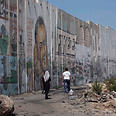
Report: PA losing billions to Israeli bans
World Bank says Palestinians could expand their struggling economy by third, slash their budget deficit in half if Israel allowed them to use 61% of West Bank territory that is now largely off-limits
The bank and donor countries supporting the Palestinians have repeatedly urged Israel to open up the restricted territory, known as Area C.
Video courtesy of jn1.tv
But the report released Tuesday marked the first detailed attempt to quantify Palestinian losses.
"Access to Area C will not cure all Palestinian economic problems but the alternative is bleak," the report said. "Without the ability to conduct purposeful economic activity in Area C, the economic space of the West Bank will remain crowded and stunted, inhabited by people whose daily interactions with the State of Israel are characterized by inconvenience, expense and frustration."
Israeli Foreign Ministry spokesman Yigal Palmor said most of the issues raised by the World Bank are to be settled in ongoing Israeli-Palestinian negotiations. Developing the Palestinian economy is in Israel's strategic interest, he said in a statement.
The partition of the West Bank into spheres of control was part of interim deals that were to have concluded with a final Israeli-Palestinian agreement on the borders of a Palestinian state by 1999.
The Palestinians want to establish such a state in the West Bank, Gaza Strip and east Jerusalem, lands captured in 1967. A new round of peace talks began in late July, but expectations of reaching a deal are low.
Meanwhile, the old arrangements remain in place. Israel has sole control over 61% of the West Bank, or Area C, while the Palestinians administer the rest. Israeli retains overall control over security and crossings in and out of the West Bank.
'Remove restrictions with due regard for security'
All of the West Bank's more than 300,000 Israeli settlers live in Area C, along with 6.6% of the territory's Palestinians, or 180,000.
Most of the West Bank's natural resources and open spaces, including the sparsely populated Jordan Valley, are located in Area C.
Yet less than 1% of Area C is open for Palestinian use, the bank said. Most of the rest of the land is controlled by Israeli settlements or has been designated as nature reserves and closed military zones, making it off-limits to Palestinians.
"The key to Palestinian prosperity continues to lie in the removal of these restrictions with due regard for Israel's security," the report said.
The bank looked at direct benefits to agriculture, Dead Sea minerals exploitation, stone mining and quarrying, construction, tourism, telecommunications and cosmetics.
The potential additional output from these sectors would be at least $2.2 billion a year, or 23% of the Palestinian Gross Domestic Product in 2011, the bank said. The bulk would come from agriculture and from exploitation of Dead Sea minerals like bromine and potash.
The total potential value added would grow to $3.4 billion, or 35% of the GDP, if indirect benefits such as improved infrastructure and spillover to other sectors of the economy are taken into account, the report said.
The added value would increase tax revenue by some $800 million, significantly reducing the West Bank's dependence on donors, the bank said.
Palmor said Israel has approved more than 300 humanitarian and economic projects in Area C in the past two years, and is reviewing projects proposed by the international community and the Palestinian Authority.










